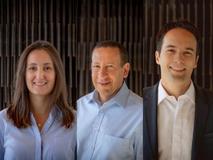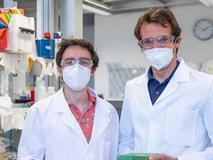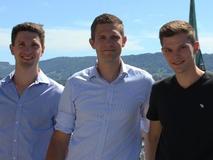Startups Developing AI Solutions for Collaborative Robots, a Medical Device to Prevent Ventilator Associated Pneumonia, Empowering Built Surfaces, Making PCR technology Accessible to More Scientists, and Optimizing Insect Breeding Each Win CHF 10,000.
10.07.2020
AICA, Aseptuva, Enerdrape, peakPCR, and SmartBreed Teams win Venture Kick’s first stage of financial and entrepreneurial support. Their projects provide a smart software which combines artificial intelligence with adaptive control for collaborative robots, present a new medical device to prevent Ventilator Associated Pneumonia, allow turning any existing underground environments into a renewable source of thermal energy for buildings, make PCR technology accessible to a wider audience such as physicians and optimize insect breeding for grasshoppers.
.jpg) |
 Aica's CEO Lukas Huber & CTO Baptiste Busch
|
 Aseptuva's CEO Eashan Saikia & CFO Henry Twerenbold
|
 Enerdrape's CEO Margaux Peltier, Lyesse Laloui and CTO Alessandro Rotta Loria
|
 peakPCR's CTO Philippe Bechtold & CEO Michele Gregorini
|
 SmartBreed: Adrian Bertschi (Technology and IT), Christoph Bertschi (Strategy and sales), Patrik Bertschi (Marketing and finance).
|
AICA: Artificial Intelligence to Simplify Robot Programming (aica.tech)
Programming an industrial robot is complicated and costly. Currently, around 2/3 of the integration cost is the sole result of programming. It is estimated that around 85% of industrial tasks are not automated due to costly and rigid programming. AICA provides a smart and simple software that combines artificial intelligence modules with simple graphical programming, to allow the creation of flexible applications for robots. AICA SarL, a spin-off from the EPFL, was co-founded by CEO Lukas Huber and CTO Baptiste Busch, respectively Ph.D. and Postdoctoral Researcher of the EPFL robotics laboratory LASA led by Prof. Aude Billard. The AI modules and flexible control algorithms are the outcome of years of research and are ready for transfer to industry. Combined with graphical programming, they simplify the interaction with robots to make production centers more agile and competitive. This is particularly relevant for the many SMEs in Switzerland. Their solution empowers robots to solve difficult tasks, such as assembly of high-precision workpieces, polishing of irregular surfaces, or implementation of frequently changing testing sets. The collaborative robot market has a size of 1.2 Billion USD and is expected to grow >600% until 2025. AICA's target market is 240 Mio. USD within the next 5 years with predicted growth. The Venture Kick funds will be used to participate in international robotic fairs, customize the product for the Swiss and international market, and develop marketing tools with a designer company.
Aseptuva: new medical device to prevent hospital infections
Aseptuva is an early-stage MedTech startup based in Technopark Winterthur with the mission to combat Healthcare Associated Infections (HAI). In a healthcare facility, catheters are crucial lifesaving equipment that delivers essential drugs into the body, but often, the surfaces of these catheters get infected by pathogens present in a hospital environment. This leads to pneumonia and bloodstream infections which take thousands of lives annually across the world, resulting in billions of dollars in extra costs. Currently, prevention techniques rely only on good hygiene, however once infected, antibiotic treatment is the sole remedy that has its own cons. To tackle this, we are developing a series of medical devices for in-situ disinfection of a wide range of catheters, thus preventing infection at its onset. Hereby the Venture Kick funds will be used for the first in-vitro studies on human cells and bacteria. Our business model will be a B2B format wherein our primary customers are medical institutions. In conclusion, the team, consisting of CEO Eashan Saikia, CFO Henry Twerenbold, and CTO Rafael Souza Lima, strive to set a new standard in critical care and impact millions of lives.
Enerdrape: empowering built surfaces (enerdrape.com)
Today, 50% of the energy consumed in Europe is used for heating and cooling of the buildings and contributes to 40% of CO2 emissions. Enerdrape, co-founded by CEO Margaux Peltier and CTO Dr. Rotta Loria Alessandro and Prof. Lyesse Laloui from EPFL, leverages a technology that allows turning any existing underground environments, such as underground garages, into a renewable source of thermal energy for buildings' heating and cooling. They developed the first available modular panel-like technology that allows them to capture both geothermal and waste heat from existing underground environments. Their easy-to-install and the cost-competitive solution is adapted to renovation and existing buildings, enabling access to renewable energy in the urban and built environment. Hence, Enerdrape contributes to the mitigating climate impact of the building sector while adding a new dimension to the renewable energy market. Financing from Venture Kick will accompany the industrialization of the prototypes and partially contribute to the recruiting for the future plan of operations in sales and logistics.
peakPCR: making PCR technology accessible to a wider audience
The Polymerase Chain Reaction (PCR) is a widely used molecular technique to make millions of copies of a DNA sample, with applications in a variety of fields such as medical diagnostics, biotechnology, and forensic sciences. CEO Dr. Michele Gregorini, CTO Philippe Bechtold, and Co-founder Prof. Wendelin Stark from the ETHZ have analyzed the heat transfer limitations of conventional PCR machines. This has led to the design of a completely new sample holder with extremely high heating and cooling rates and a much lower sample volume, in order to cut analysis time from currently 1-2 h down to 10 minutes, and reagent consumption by 90%. Next to a first stand-alone desktop instrument, they have also developed a portable version that is battery-powered and that operates in conjunction with a smartphone. peakPCR aims to deploy these PCR devices to research and private laboratories at affordable prices. The team will use the Venture Kick funds to finance the finalization of the technology for the market launch.
The Polymerase Chain Reaction (PCR) is a widely used molecular technique to make millions of copies of a DNA sample, with applications in a variety of fields such as medical diagnostics, biotechnology, and forensic sciences. CEO Dr. Michele Gregorini, CTO Philippe Bechtold, and Co-founder Prof. Wendelin Stark from the ETHZ have analyzed the heat transfer limitations of conventional PCR machines. This has led to the design of a completely new sample holder with extremely high heating and cooling rates and a much lower sample volume, in order to cut analysis time from currently 1-2 h down to 10 minutes, and reagent consumption by 90%. Next to a first stand-alone desktop instrument, they have also developed a portable version that is battery-powered and that operates in conjunction with a smartphone. peakPCR aims to deploy these PCR devices to research and private laboratories at affordable prices. The team will use the Venture Kick funds to finance the finalization of the technology for the market launch.
Smartbreed: Full insect breeding solution out of one hand (smartbreed.ch)
The world population is constantly increasing and our resources are limited. What is needed is an environmental-friendly, sustainable, and healthy protein source. SmartBreed is a Swiss Agritech start-up that offers insect breeders a local and complete breeding solution. Co-founded by CEO Christoph Bertschi, Adrian Bertschi Ph.D. in Bioengineering at ETH Zürich and Patrik Bertschi Law at HSG, SmartBreed aims to produce automated breeding solutions for grasshoppers. They want to make the advantages of insects industrially usable. Therefore SmartBreed offers stackable, fully automatic breeding boxes in which grasshoppers can be bred cost-effective, resource-saving, and hygienic - local and directly at the customer site. In addition to the sale of breeding boxes, the company offers insect food and insect eggs for breeding, which are automatically processed in the box. Their boxes are equipped with many sensors to constantly optimize the breeding conditions with the collected data. SmartBreed targets Zoos, insect food producers and livestock (incl. pet) feed produces and estimates a significant market size and future growth rate especially in the livestock feed market. The Venture Kick Funds will primarily be used for new customer acquisition in the different markets.


